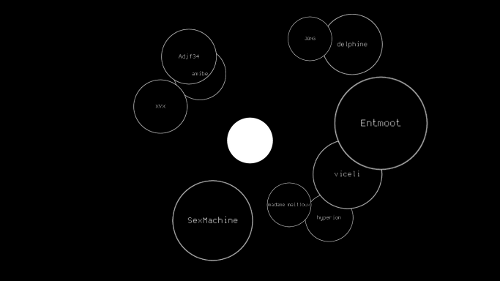home // text // multi-media // misc // info
game-design ludum-dare Ludum Dare 22 – Oases (Final)
As reported previously, last weekend I took part in my first Ludum Dare, a (nearly 10 year-old) 48-hour Internet-wide game jam. Interested parties had previously voted for the theme “Alone,” and then at 21h (local Montréal time), we were off to the races.
Some screenshots of my entry – Oases – below, and a few more words below that.
Now with a theme like “Alone,” there’s obviously going to be a large share of Limbo- or Closure-likes – because once an innovative game is popular, by Humphrey, everyone wants to innovate the same way. (Actually, that’s unfair: I’ve since played and voted on a number of really interesting puzzle or exploration games, for instance.)
So, bypassing all ideas of “it’s art because death,” I started to think about wireless networks, which is frankly something I do almost every Friday night. It occurred to me that I was swimming in them – my neighbour had recently pointed out a new one with a creative name, as people seem fairly wont to do. I started to like the idea of incentivising players to escape from the wifi – a sort of reverse-wardriving. I toyed with the idea, for instance, of making a shmup where every visible wifi network becomes an enemy spawner. But of course, a (well-balanced) shmup takes more than two days of work, so I knew I’d have to scale back somewhat.
In the end, I made it as simple as possible. Visible networks are represented on-screen (as shown above), and this list of objects is periodically refreshed. The “netspawn” (as I like to call them (and as the C++ class is called)) emit all sorts of noises swiped from Freesound.org – I figured the more cacaphonic the netspawn (Googlewhack?), the more relieved the player will be to get away. Actually, as I was collecting sound clips, the idea of a vague narrative formed in my mind, though I’ll leave its discovery (and its implications for the competition’s theme) as an exercise to the reader. And finally, the game becomes brighter as the number of visible networks drops – I sort of got off on the mental image of a solitary gamer trundling knee-deep in snow, in the woods or a park, carrying in their laptop a brilliant, shining point of light.
Anyway, the original network code I used was a bit finnicky and Windows-specific; I’ve since replaced it with parts from the Qt API, so it should be more cross-platform and stable (if it doesn’t work, let me hear it!). The game’s available here (in Windows and Linux flavours), as well as on the Ludum Dare site itself.
Hope you dig my own little take on the theme. And I hope you dress warm.


